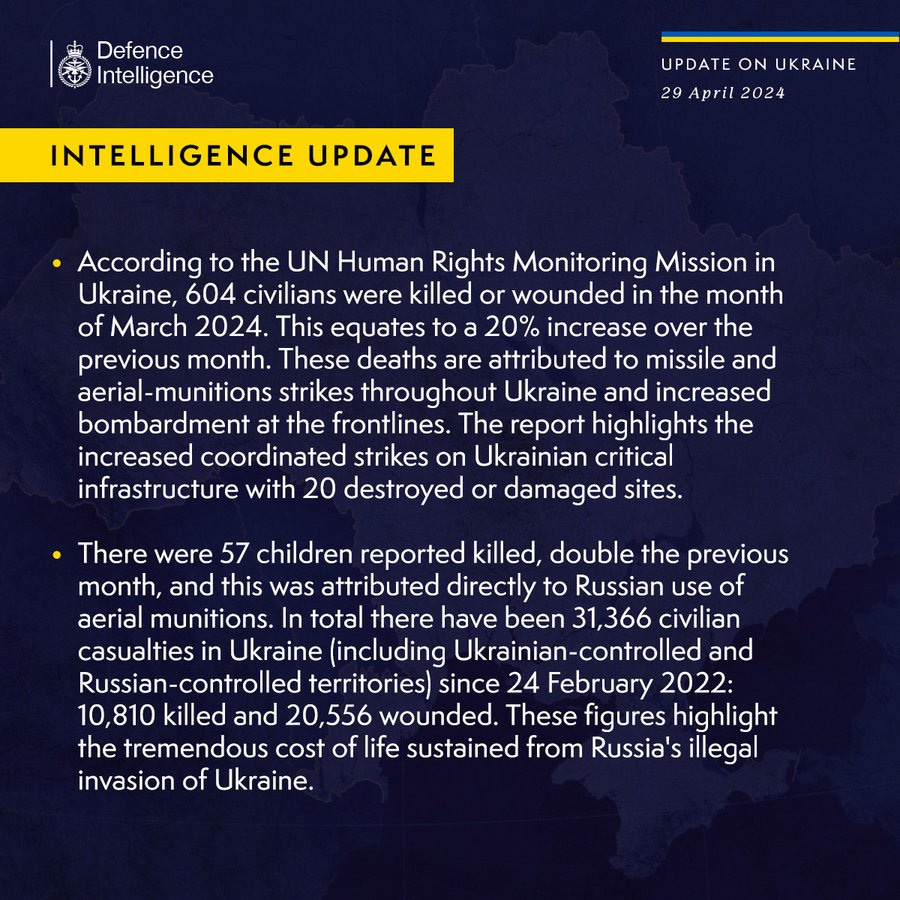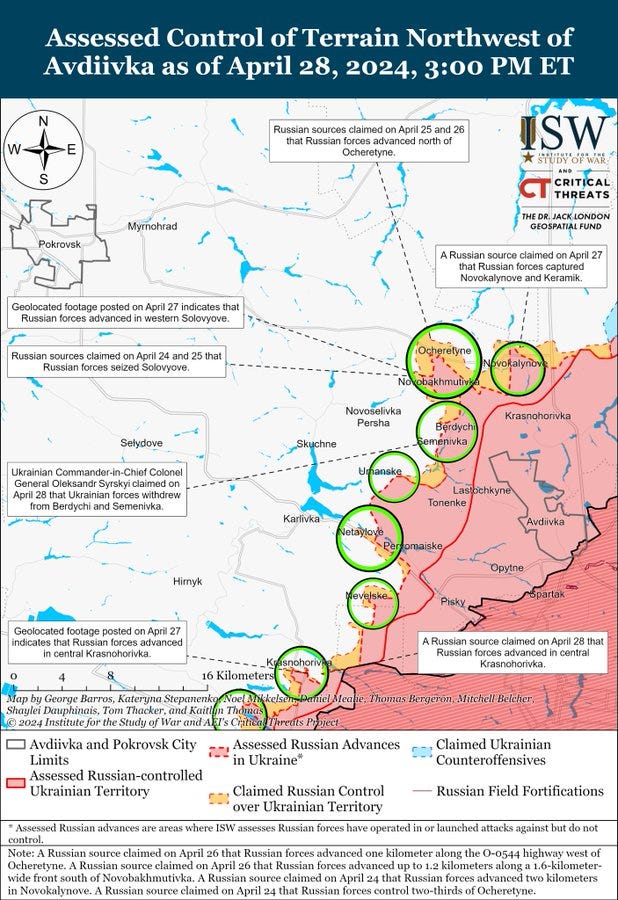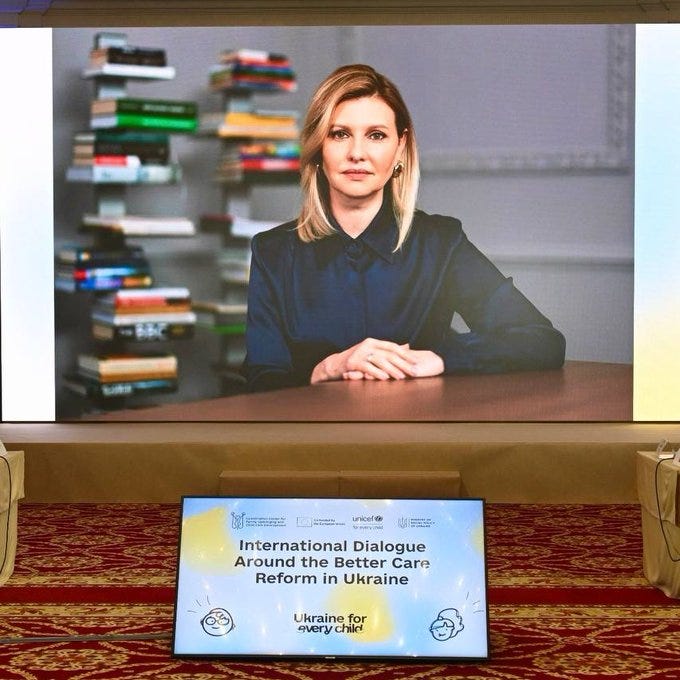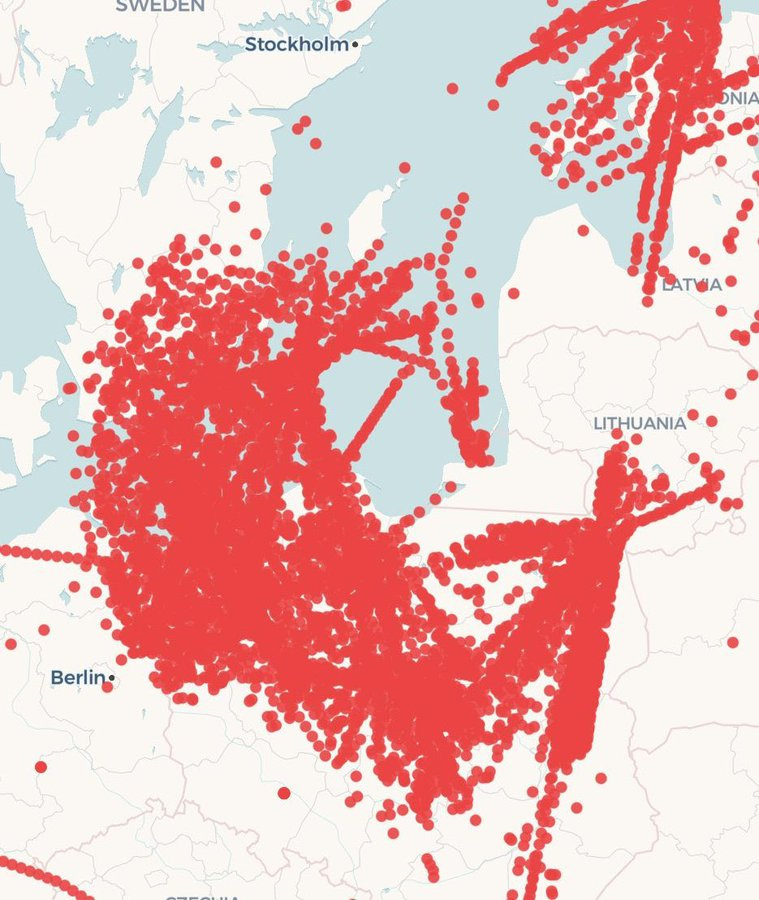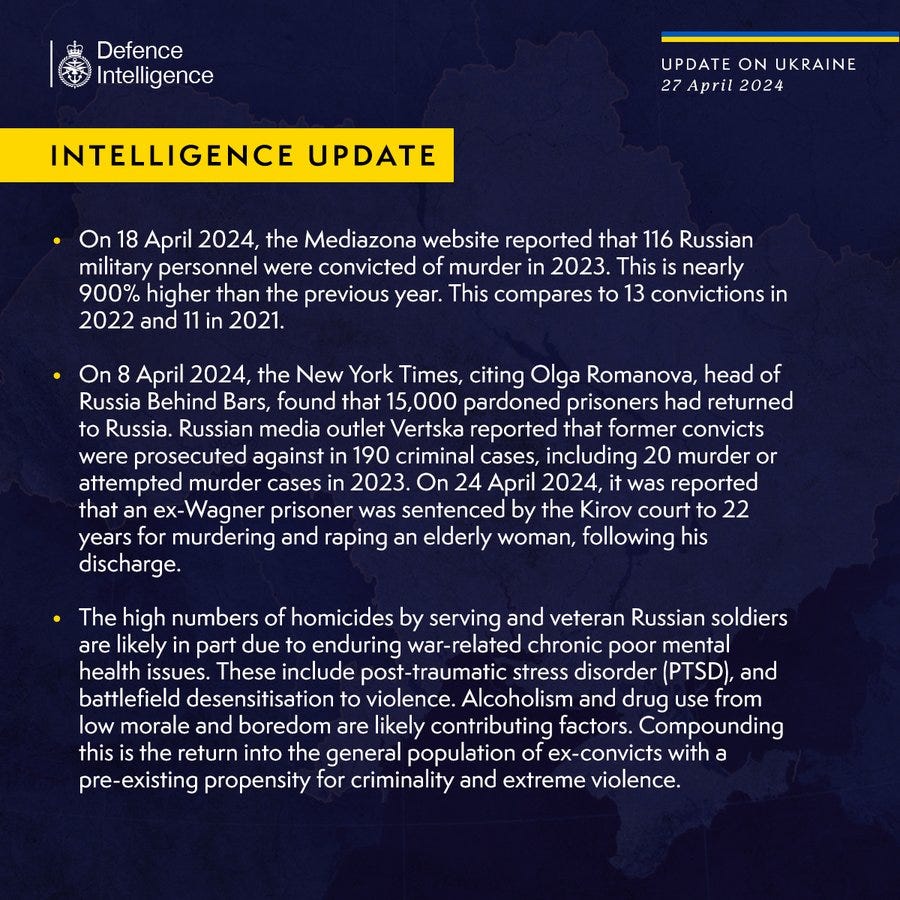Apr : E-Stories
RUattacksUA Georgia CombatSit BehindLines GPSJamming Turkey InRussia Allies China PrinceReuss A&P Anteleva UKDef ISW CDS Noel Lucas Lautman Weiss Ukrinform Kokcharov Kannike Raufoglu Politico
Catching up…
EA Worldview’s Ukraine Up-date- hop over to Scott’s amazing hourly Ukraine up-date page. I’ll fill in with some bits and bobs.
Day 14 of the Opposition rally held in Tbilisi denouncing 'foreign agents' law. On April 28 in Tbilisi, Georgia, an opposition rally opposing the foreign agents law occurred, starting from Republic Square and culminating at the Parliament. Participants chanted slogans denouncing the legislation and projecting messages onto the Parliament building, including “No to the Russian law.”
In the video below, the woman says, "How can you attack us? Your friends are here, your family members are standing here. Are you out of your mind?”
Natalia Anteleva: This protester says and raises her arms as riot police pushes at her. And I just happen to know this amazing brave woman. Kristo Talakhadze!
Stories we’re following…
CDS: According to information provided by the Situation Center of the Ministry of Defense of Ukraine, Russian forces shelled 12 regions of Ukraine over the past day. A total of 129 towns and villages and 106 infrastructure objects were attacked with various types of weapons. The number of casualties is being updated/clarified.
The enemy attacked the Ukraine's energy infrastructure in Dnipropetrovsk, Ivano-Frankivsk, and Lviv Oblasts. Russia attacked four thermal power plants owned by DTEK. The company said that the equipment of the facilities was seriously damaged and there were injured civilians.
Two critical energy infrastructure objects were hit in the Stryi and Chervonohrad districts of Lviv Oblast, setting them on fire. There is currently no threat of power outages but people are asked not to use energy intensive devices during peak consumption hours.
Russian attacks in Kharkiv Oblast injure 2 civilians. Russian troops struck the cities of Kupiansk and Vovchansk in Kharkiv Oblast on April 28, injuring two people, local authorities reported.
Naftogaz: Russia's morning attack targeted gas infrastructure. The Naftogaz Group did not specify in what oblasts the targeted gas facilities were located, nor what the full consequences of the attack were.
Maria Avdeeva: Crater in the yard of the psychiatric clinic in Kharkiv after Russia attacked it with S-300 missiles. They’ll probably try to justify it as a military target.
Me: one of my war journo friends who spent some time in Ukraine’s war-torn east had sent me videos privately demonstrating the craters the Russians missiles made. In one video the crater was next to their hotel.
Ukraine’s military intelligence says it hit Russian $5 million radar system. The Podlet-K1, also known as the 48Ya6-K1, is a modern mobile radar system designed to detect air targets at low and extremely low altitudes, according to the Army Recognition website.
Consequences of an attack by Ukrainian drones on the Kushchevsk military airfield. A warehouse with equipment for converting bombs - fragments of correction and planning modules, as well as nose cones for aerial bombs, were reportedly inside.
Source: SBU hits oil refineries, military airfield in Russia’s Krasnodar region. The Security Service of Ukraine (SBU) launched drone strikes against two oil refineries and a military airfield in Russia’s Krasnodar region overnight on April 27, a source in the security and defense forces told the Kyiv Independent.
Russian media: Russia's Krasnodar Krai oil refinery 'partially suspends' operations after drone attack. A Russian oil refinery in Slavyansk-on-Kuban in Krasnodar Krai partially suspended operations following a purported Ukrainian drone attack, Russian state-owned news agency TASS reported on April 27.
Military intelligence: 2 locomotives destroyed in Russia. Two diesel locomotives have been destroyed in Russia over the past few days, Ukraine's military intelligence (HUR) reported on April 28.
Noel Report: It is reported that since early this morning, the KamAZ automobile assembly plant is on fire in Naberezhnye Chelny, Tatarstan.
Ukrinform: Methodical attacks against Russia's petroleum production industry (allegedly by the Security Service of Ukraine) are ongoing. Gasoline imports from Belarus and Kazakhstan have been implemented to prevent domestic prices from skyrocketing.
Combat Situation Update
Syrskyi: Ukrainian forces retreat west from 3 villages in Donetsk Oblast. The villages are in the Pokrovsk District of Ukraine's Donetsk Oblast, which remains one of the hottest sectors of the front line as Russia continues its offensive.
Military: Russia gains foothold in Ocheretyne in Donetsk Oblast. "The part (of Ocheretyne) in which the enemy is located is under our fire control. All steps are being taken to push the enemy out of there," Nazar Voloshyn, a spokesperson of the Khortytsia group of forces, said on April 27.
ISW: Russia unlikely to achieve significant near-term gains near Avdiivka, despite limited Ukrainian retreat. Russian forces are unlikely to achieve "operationally significant penetration" in the areas west of Avdiivka in Donetsk Oblast, despite limited Ukrainian troop withdrawals in surrounding villages, the U.S.-based think tank Institute for the Study of War (ISW) assessed on April 28.
CDS Report: General situation—94 combat engagements on various fronts.
Russian forces conduct attacks on Bohdanivka, Ivanivske, Klishchiivka, and Andriivka aiming to bypass Chasiv Yar and create conditions for the operational encirclement and capture of the city.
The situation in the area of Ocheretyne is becoming critical, and if current trends persist from April 15-17, the Ukrainian Defense Forces will need to withdraw 10-15 km to the Novooleksandrivka-Komyshivka-Karlivka Reservoir-Karlivka line. This retreat will lead to the loss of Netaylove, Karlivka, Novoselivka Persha, Umanske, and several other villages.
The successful enemy advancement in the Ocheretyne area is due to firepower and air superiority rather than numerical superiority.
Novopavlivka direction, Russian forces have advanced through the fields east of Krasnohorivka and breached Ukrainian defense in the area of Paraskoviivka. Battles have been ongoing near Krasnohorivka, Heorhiivka, Pobieda, Novomykhailivka, and Vodyane.
Freeonis: Russian technology. I realise most of this stuff is part of the psychological war being fought between Ukraine and Russia, but some of it is fun.
Behind the Lines
The first reparation payments are to be made in the next few weeks to survivors of wartime rape by Russian soldiers during the invasion of Ukraine, in a move that Ukraine’s first lady, Olena Zelenska, called “an important step towards restoring justice”.
Up to 500 Ukrainian survivors of conflict-related sexual violence are being identified and awarded with interim reparations this year, including financial, medical and psychological support.
Zelenska said: “Reparations to victims of gross human rights violations, including victims of conflict-related sexual violence, are not just about economic support. It is an important step towards restoring justice.
Olena Zelenska: To have more foster care families in Ukraine, we have to provide housing and state support. Awareness is also needed, as 14% of Ukrainians know about foster families, but only 5% know about patronage. Talked about it at the International Dialogue on Reforming Child Care and Support System.
The attacks targeted transportation hubs in Ukraine close to the Polish and Romanian borders. Information about the Russian attacks was kept quiet. In warfare, it’s normal to be hitting these important logistical areas. This is why Ukraine needs more air defence to cover sensitive areas as well as civilian centres.
Ukraine's military intelligence launches cyberattack against United Russia party. United Russia claimed earlier in the day that its electronic services were under large-scale DDoS attacks.
Erik Kannike is reporting about the second Russian GPS jamming attack. In the first attack, Finnair plane had to abort landing at Tartu airport due to GPS interference, as reported by ERR.
Mark Mikhelsen posted a picture of what the Russian GPS jamming looks like:
FT: Turkey in talks with ExxonMobil to secure LNG deal, aims to reduce reliance on Russian natural gas. Turkey is in talks with ExxonMobil to secure a long-term liquified natural gas (LNG) deal worth billions of dollars, aiming to diversify its energy sources, says Turkish Energy Minister Alparslan Bayraktar. The potential agreement could provide up to 2.5 million tons of LNG annually for 10 years.
SkyNews: The Foreign Office has summoned Russia's ambassador to the UK after a British man was charged over an arson plot on London businesses linked to Ukraine.
Dylan Earl is alleged to have engaged in conduct targeting the businesses in order to benefit the Russian state. He has been charged under the National Security Act 2023 - the first case to involve alleged offences under the new spy laws.
Earl is accused of undertaking fraudulent activity, research and reconnaissance of targets, and attempting to recruit individuals to materially assist a foreign intelligence service carrying out UK-related activities, prosecutors say.
Earl is accused of organising and paying for an arson attack on two units on an industrial estate in Leyton, east London, on 20 March. The blaze required 60 firefighters to bring it under control. Four others have also been charged in connection with the case, it can now be reported.
Two other men - Paul English, 60, and Nii Mensah, 21 - have been charged with aggravated arson. Jake Reeves, 22, has been charged with agreeing to accept a material benefit from a foreign intelligence service - as well as aggravated arson. A fifth man - Dmitrijus Paulauska, 22 - has been charged with having information about terrorist acts.
Meanwhile in Russia
The head of several companies subordinate to the Ministry of Defense, Anton Filatov, have been charged with embezzlement, Kommersant reports. It is not specified what amount we are talking about. The time period and the affected structure are also not specified.
From 2002 to 2010, the defendant held senior positions at enterprises of the Russian military-industrial complex, and then went into commerce for two years. After Ivanov became the head of Oboronstroy JSC in 2013, Filatov began to receive leadership positions in enterprises subordinate to the Ministry of Defense: 1470 UMTO JSC, Spetstransleasing JSC and Oboronlogistics LLC.
The latter organization, by order of the Russian government, became the sole executor of procurements, works and services carried out by the Ministry of Defense in 2019–2020 related to the delivery of troops and cargo to the Arctic zone and the Far East.
The Russian authorities raided Moscow’s Garage Museum of Contemporary Art on Friday, according to multiple Telegram channels. The Museum is owned by Abramovich. Novaya Gazeta Europe said officers spent about two hours searching the building, while a source close to Russia’s law enforcement agencies told RBC that the FSB was responsible.
Russia's Sberbank reports $4.32 billion profit, dividends to boost Kremlin war chest. Being majority-owned by the Russian state, dividends can be used to fund the full-scale invasion of Ukraine.
Scott Lucas reports that Putin hands over Russia assets of European appliance manufacturers to subsidiary of Russia State energy giant Gazprom Decree transfers assets of Italy's Ariston and Germany's BSH Hausgerate, with its Bosch, Siemens and NEFF brands.
Italy summoned Russia’s ambassador after Moscow announced it was putting a subsidiary of Italian heating firm Ariston under the “temporary management” of state energy company Gazprom. An EU spokesperson condemned the move as “yet another proof of Russia’s disregard for international law and rules” and called on Moscow to reverse it. Since invading Ukraine, Moscow has taken the Russian subsidiaries of a number of western companies – notably French food giant Danone and Danish brewer Carlsberg – under what it calls temporary control.
Medvedev threatens Russia may seize private US assets if Washington seizes frozen Russian reserves. Russia could seize assets and property of U.S. individuals held in Russia if Washington confiscates Russian sovereign assets, Dmitry Medvedev, the deputy chairman of Russia's Security Council, threatened on April 27.
Russia on Saturday said it would require major exporters to carry on converting the bulk of their foreign currency earnings into rubles for another year to help support the national currency. Moscow has used strict capital controls to prop up the value of the ruble in the two years since the west levelled sweeping financial sanctions in response to Russia’s invasion of Ukraine.
Fraud in Russia seems to be spreading. Young investors in a Beribit crypto exchange scheme received chocolates as return on their investment. Approximately $4.3 million of investors' funds are frozen in the accounts of the crypto exchange. Customers have been storming the office for the second day, demanding their money back.
Kremlin spokesman, Dmitry Peskov on ATACMS to Ukraine:
“There will be more victims in Ukraine, there will be more destruction in Ukraine. The buffer area will be expanded. And to those who made the decision regarding ATACMS - you violated domestic US law. The result of our special operation has already been decided, and the current dynamics on the fronts demonstrate this,” kremlin spokesperson Peskov said.
The UK authorities’ investigation into a suspected arson attack has led to charges against two men for allegedly assisting Russian intelligence services. According to prosecutors, 20-year-old Dylan Earl and 22-year-old Jake Reeves “engaged in conduct targeting businesses which were linked to Ukraine in order to benefit the Russian state.” Three other men have also been charged in connection with the fire.
NEW: GRU Unit 29155, Russia's notorious assassination and sabotage squad, ran a family of illegals for years in Czechia. Meet arms dealers Nikolay and Elena Šapošnikov. Friends of Unit 29155 founding commander Gen. Andrey Averyanov, they helped the same operatives who poisoned Sergei Skripal blow up two Czech warehouses in 2014. The facilities contained weapons and ammunition destined for Georgia, Ukraine and the Free Syrian Army. Read it here.
Allied Support
A129-Mangusta—UK Defence Minister, Grant Schapps, let the cat out of the bag: As imagined, Italy has provided to Ukraine an unknown amount of Storm Shadow missiles. Like always Italian aid to Ukraine is kept secret. They had been sent together with France last year and were actively used to strike Crimea.
Australia announces $65 million aid package for Ukraine. The Australian government announced a new aid package for Ukraine worth 100 million Australian dollars ($65 million) on April 27, following a meeting between Prime Minister Denys Shmyhal and Australian Defense Minister Richard Marles in Lviv.
Slovak citizens raise $4 million for Czech ammunition initiative after government refuses to contribute. Slovak activists collected 3.9 million euros ($4 million) for the Czech ammunition initiative for Ukraine in 12 days, after the Slovak government refused to participate.
Minister: Belgium to allocate $213 million for German-led air defense initiative. Belgium will pledge 200 million euros ($213 million) for the German-led air defense initiative and supply Ukraine with rockets, Belgian Defense Minister Ludivine Dedonder announced on April 26.
Canada to donate nearly $12 million to Ukraine's drone production, Czech ammunition initiative. This is the first time Canada has directly contributed to the production of military drones in Ukraine.
The Prince, the Plotters and the would-be putsch
(Do not miss this story.)
One of the largest legal proceedings in German history is due to start on Monday with the first of three trials of a group of far-right conspiracists who planned to violently overthrow the country’s parliament.
So sprawling is the network, so extensive their plans, that for a mixture of logistical and security reasons, the 27 people due in the dock have been split into three separate groups.
On Monday a group of nine, identified as the “military wing” behind the group ringleader, the self-proclaimed Heinrich XIII, Prince Reuss, 72, will be the first to go on trial in the southern city of Stuttgart on terrorism charges. Nine others, including Reuss and other prominent members, go on trial in Frankfurt on 21 May.
Prince Reuss, an antisemitic businessman, descended from a formerly aristocratic family, founded the group with the express wish to violently eliminate the state order. In the event of the coup’s success, he was due to be declared provisional head of a new German state, which would have redrawn the country according to its 1937 borders.
Politico: Coca-Cola, L’Oréal, other big brands told by MEPs to stop ads fueling Russian disinformation in Balkans
Global companies get heat for financing pro-Kremlin media in Serbia and Bulgaria with their advertising budgets.
The 15 brands should "rigorously review [their] advertising policies to ensure that your expenditures do not, even unintentionally, fund outlets known for disseminating harmful disinformation," said the letter sent Thursday by Bulgarian conservative MEP Andrey Kovatchev and 15 other lawmakers from the center right, liberals, socialists and the Greens.
The targeted companies are Lidl, Delhaize Group, Procter & Gambler, Coca-Cola, A1, Yettel, Ferrero, Heineken, Mars, Mondelez, L'Oréal, GlaxoSmithKlein (GSK), Bosch, Samsung and Amazon.
Kovatchev told POLITICO that "anti-democratic narratives from malign forces are a severe threat to our democracy," especially "in this pivotal election year."
EU officials and disinformation experts have been warning about a growing tide of fake news online and foreign attempts to sway the vote ahead of the June parliamentary election.
"Many media organizations that promote pro-Kremlin disinformation often use advertising bought by reputable companies to strengthen their credibility," Kovatchev said, adding that these brands were not always aware they could end up "support[ing] pro-Russian propaganda channels."
Catching Spies: What do the Chinese want and how do they go about it?
France24: The arrest this week of an aide to the far-right Alternative for Germany (AfD)'s lead candidate for the European parliamentary elections on accusations of spying for China is yet another blow to a party already tarnished by scandals involving alleged payments from sources close to Moscow. France24 asked Mareike Ohlberg, a sinologist with the General Marshall Fund, about Chinese penetration and spying.
“The aims of Chinese political interference operations are to gather information about the target country's views on China, and then to influence the way in which China is perceived,” Ohlberg said.
“The CCP does things differently with the traditional parties in Germany," Ohlberg added. "It tries to influence the major economic players, who then pass on the right message to their elected representatives.”
Chinese interference is “increasingly taking the form of operations aimed at demonstrating the weaknesses of Western democracy, and this is the kind of rhetoric that an AfD politician is more likely to repeat”, she noted.
The growing number of foreign interference scandals – Russian and Chinese – involving the AfD points to a growing "security problem" in Germany. But for Ohlberg, the far-right party is merely a symptom.
“The security risk stems above all from a ‘very 1990s’ attitude to foreign threats that persists in Germany. In other words, there is still the impression that the Cold War has just ended and that we can concentrate on economic development without worrying too much about foreign spies", she said.
Fun Fact: there are 28 far-right parties running in the up-coming EU parliamentary elections. That’s not counting the far-left. It can be said that authoritarian states, such as Russia and China, tend to influence members of these kinds of parties, but that doesn’t limit their reach.




